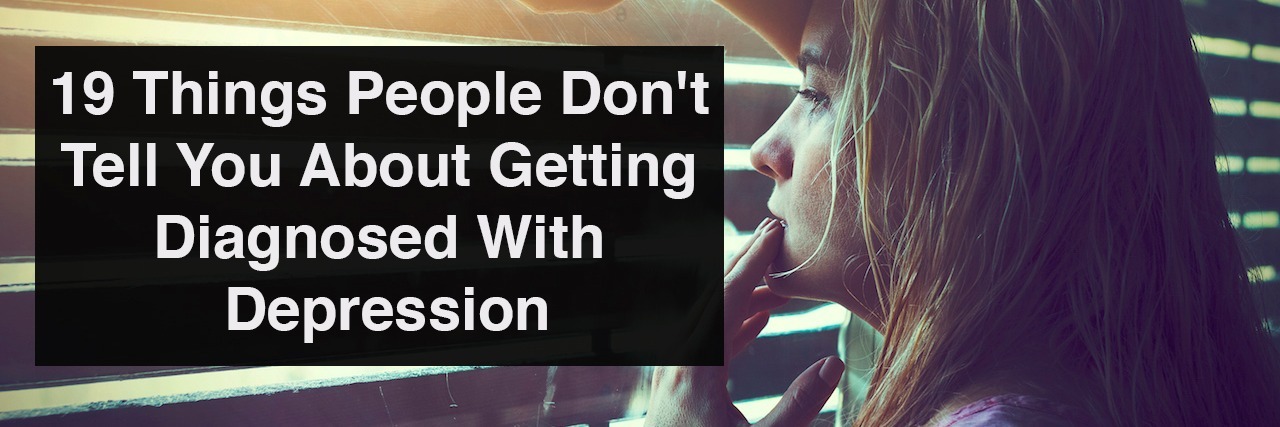Editor’s note: This post reflects the experience of individuals and may not apply to every person with depression.
So, you’ve been experiencing symptoms of depression for a while. The emptiness, the lack of interest in doing things that normally bring pleasure, the changes in appetite and sleeping patterns. Symptoms that make you ask yourself, “Do I have depression?”
Getting a depression diagnosis can bring up a multitude of responses. Maybe you’ve never been given a diagnosis before or are having trouble accepting a new depression diagnosis. Maybe you are feeling some relief to finally put a name to what you’ve been experiencing. But no matter what your diagnosis story is, getting a depression diagnosis can sometimes feel like entering the unknown.
Because it can be hard to know what to expect after being diagnosed with depression, we asked people living with depression in our mental health community to share what they were unprepared for after being diagnosed with depression.
Here’s what they shared with us:
1. “I thought a diagnosis would be the end of it and that the fight was over because I knew what the problem was. I wasn’t ready for the amount of effort that goes into fighting my depression post-diagnosis.” — Shannon A.
2. “Some people are going to be amazingly understanding. Others won’t understand at all and push you away.” — Ellie F.
3. “I wasn’t prepared for all the experiments with all the different medications to find what would work for me.” — Court B.
4. “Soon after my diagnosis, I became hyper-critical of my decisions made in the past, the relationships I either ended or ended on the other end. Everything was called into question and I agonized over whether or not my actions were because of my illness or a result of it.” — Sean C.
5. “The relief of knowing there was something ‘concrete’ after so long [of] not recognizing I was so ill. It gave me permission to start looking after myself. It’s a long route back but being diagnosed was the first step.” — Catherine W.
6. “The many years of medication trials, therapy and hospitalizations. I wasn’t told just how bad depression can get and that it can be a really long journey of recovery.” — Megan E.
7. “The chronic pain and bowel issues. I didn’t realize how much of a physical toll it would take on my body.” — Kathleen L.
8. “I never realized for some people depression is a lifelong struggle you have to combat every single day.” — Allie R.
9. “There is light at the end of the tunnel. Those who stayed with you during the ride will always be there.” — Shelley S.
10. “I was unprepared for antidepressants to make me feel much, much worse initially.” — Lucy D.
11. “My family’s reactions. They tried to suggest I just needed to do X, Y and Z and I’d be better. They also tried to discourage me from ‘advertising’ my depression. I felt like it was something shameful that should be hidden.” — Jenny B.
12. “The severity of the downs. I didn’t realize just how debilitating it could be.” — Matthew Z.
13. “I didn’t think it would be so easy to connect and talk with people I didn’t know, but so difficult to connect and talk to people I’ve known for years.” — Nichole J.
14. “I was unprepared for the sense of validation I got. I finally knew for a fact I was not ‘just sad’ or ‘just having a bad day’ or ‘going through a phase.’” — Jessica A.
15. “I was unprepared for the amount of money I would have to spend to get treatment.” –Emma C.
16. “The fact that not everyone sees a diagnosis of depression as a real illness.” — Gabrielle H.
17. “The change I’d go through. From denial to awareness to understanding to acceptance to embracing myself the way I am.” — Oshra G.
18. “I didn’t realize how much patience would be involved in getting through this. The time between therapy appointments where I don’t know what to do with myself, the time it takes for meds to work.” — Lauren B.
19. “The acceptance of myself… My depression does not define the person I am.” — Lauren C.
If you or someone you know needs help, visit our suicide prevention resources page.
If you need support right now, call the National Suicide Prevention Lifeline at 1-800-273-8255 or text “START” to 741-741.
We want to hear your story. Become a Mighty contributor here.


